2020—2021学年 Unit6 Outdoor fun Grammar 课件20张
文档属性
| 名称 | 2020—2021学年 Unit6 Outdoor fun Grammar 课件20张 | 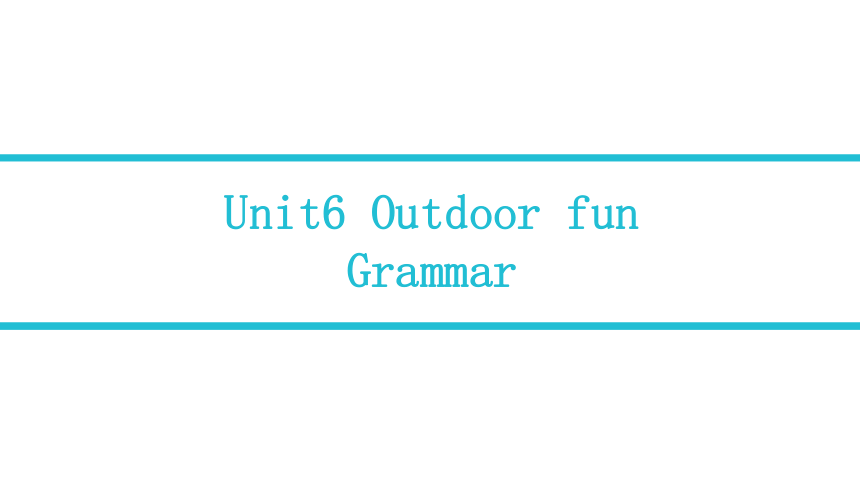 | |
| 格式 | zip | ||
| 文件大小 | 984.9KB | ||
| 资源类型 | 教案 | ||
| 版本资源 | 牛津译林版 | ||
| 科目 | 英语 | ||
| 更新时间 | 2022-04-11 15:27:08 | ||
图片预览


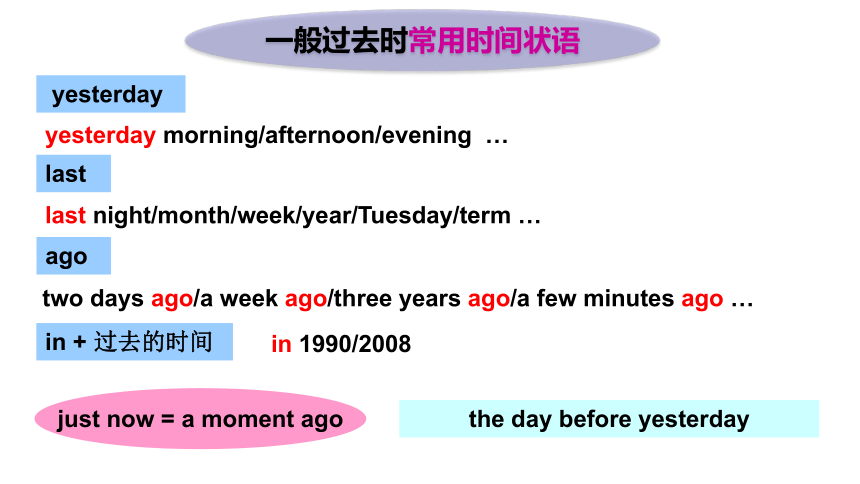
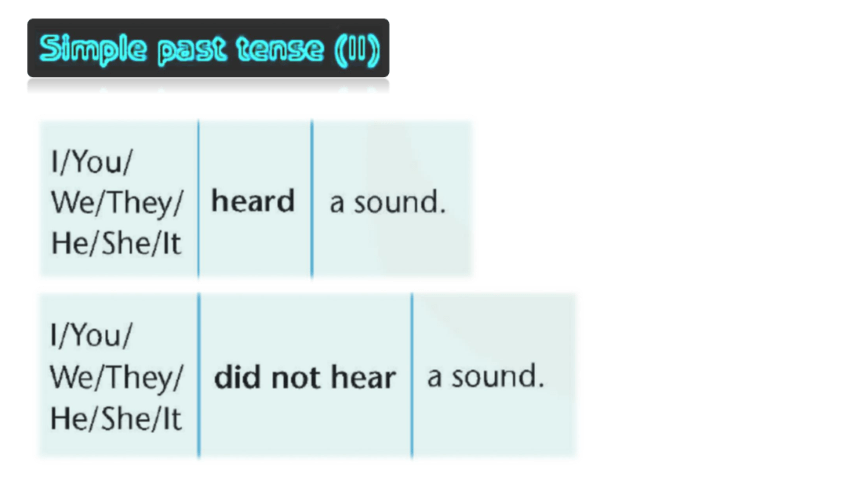
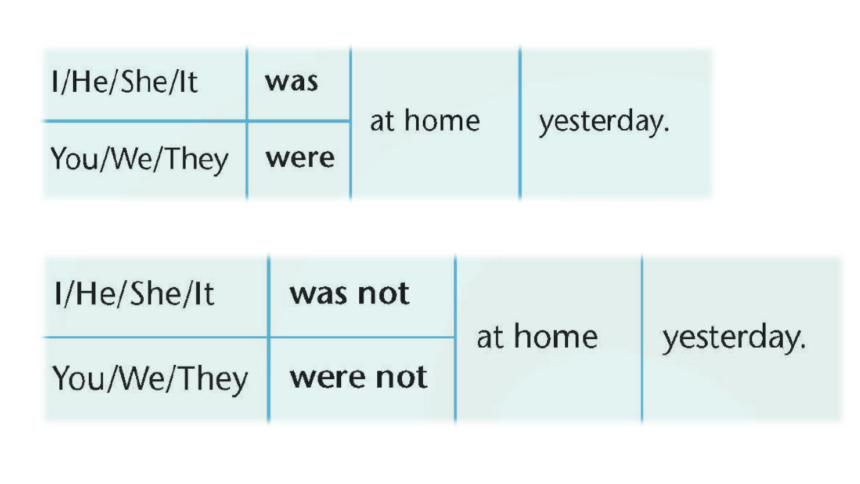

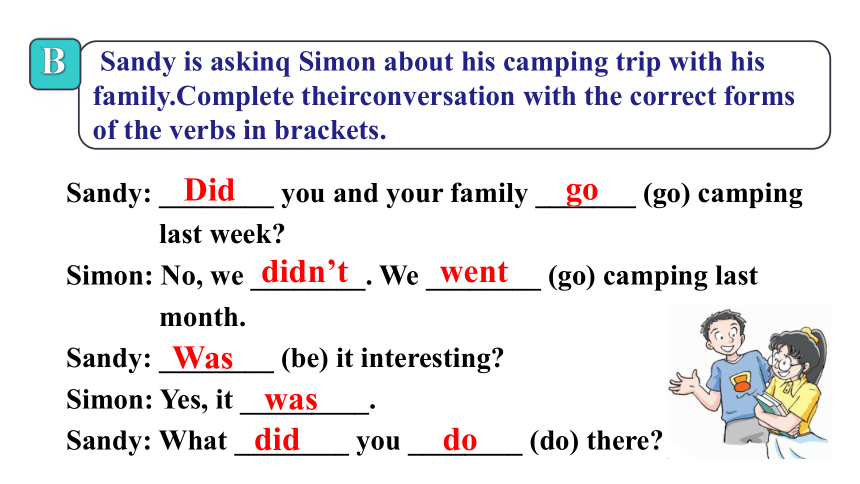

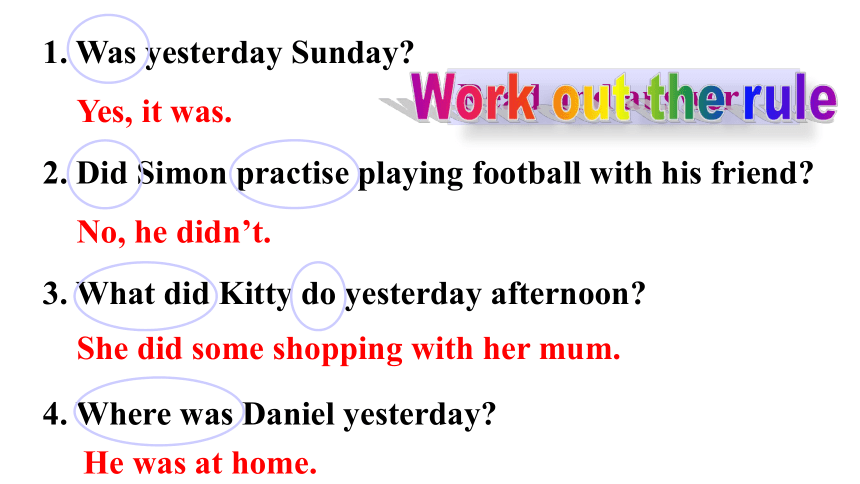
文档简介
(共20张PPT)
Unit6 Outdoor fun
Grammar
That day, on my way home, I saw Alice and her sister by the river.
The other day, when I took a walk, I heard some students talking about how to help Alice.
Simple past tense
Brainstorm: Think about more time expressions.
一般过去时常用时间状语
yesterday
last
ago
yesterday morning/afternoon/evening …
last night/month/week/year/Tuesday/term …
two days ago/a week ago/three years ago/a few minutes ago …
just now = a moment ago
in + 过去的时间
in 1990/2008
the day before yesterday
A
Millie is writing about what she and her friends did last weekend.Help hercomplete her article with the correct forms of the verbs in the box.
do go have play
practice read stay visit
Sandy: ________ you and your family _______ (go) camping
last week
Simon: No, we ________. We ________ (go) camping last
month.
Sandy: ________ (be) it interesting
Simon: Yes, it _________.
Sandy: What ________ you ________ (do) there
Sandy is askinq Simon about his camping trip with his
family.Complete theirconversation with the correct forms
of the verbs in brackets.
B
Did
go
didn’t
went
Was
was
did
do
Simon: We _________ (put) up our tent near a lake. My cousin
Annie and I _______ (be) very happy. We also _______
(row) a boat on the lake.
Sandy: _______ you ________ (stay) outside all night
Simon: Yes, we _________. The camping trip _______ (be)
really wonderful.
put
were
rowed
Did
stay
did
was
1. Was yesterday Sunday
2. Did Simon practise playing football with his friend
3. What did Kitty do yesterday afternoon
4. Where was Daniel yesterday
Read and answer
Yes, it was.
No, he didn’t.
He was at home.
She did some shopping with her mum.
Work out the rule
Yesterday was Sunday.
Millie _______ the park and ______ a good time.
Simon ______ ______ football. He _________ playing volleyball with his friend.
Kitty likes shopping. She _______ some shopping with her mum yesterday afternoon.
visited
had
didn’t
play
practised
did
didn’t
go
stayed
read
Daniel _______ ______ out yesterday. He ________ at home and _______ some books.
语 法 聚 焦
[一般过去时(Ⅱ)]
1.Was he at home yesterday 他昨天在家吗?
2.—Did you and your family go camping last week
—No, we didn't.
“上周你和你的家人去野营了吗?”“不,我们没有。”
教 材 典 句
3.—What did you do there
—We put up our tent near a lake.
“你们在那做什么了?”“我们在湖边搭了一个帐篷。”
4.My cousin Annie and I were very happy.
我堂妹安妮和我非常高兴。
1.be动词的一般过去时用于描述过去存在的某种状态。
(1)be动词的过去式变化:am/is—was; are—were
(2)句式变化:
肯定句: 主语+was/were+其他.
否定句: 主语+wasn't/weren't+其他.
一般疑问句:Was/Were+主语+其他?
语 法 探 究
肯定回答:Yes, 主语+was/were.否定回答:No, 主语+wasn't/weren't.
Eddie was ill yesterday.昨天埃迪生病了。
Eddie wasn't ill yesterday.昨天埃迪没有生病。
—Was Eddie ill yesterday 昨天埃迪生病了吗?
—Yes, he was./No, he wasn't.
是的,他生病了。/不,他没有生病。
2.实义动词的一般过去时的句式变化:
肯定句:主语+动词过去式+其他.
否定句:主语+didn't+动词原形+其他.
一般疑问句:Did+主语+动词原形+其他?
肯定回答:Yes, 主语+did. 否定回答:No, 主语+didn't.
I lost my watch yesterday. 昨天我丢了我的手表。
I didn't lose my watch yesterday. 昨天我没有丢手表。
—Did you lose your watch yesterday 昨天你丢了手表吗?
—Yes, I did./No, I didn't. 是的,我丢了。/不,我没有丢。
1.He often forgets to bring his homework to school. Today, he ________ it at home again.
A. forgot B. forgot about
C. left D. threw
C
活 学 活 用
2.—Excuse me, sir. I'm afraid you can't smoke here. This is non smoking area.
—Oh, sorry. I ________ the sign.
A. don't see B. didn't see
C. didn't saw D. saw
B
[解析]考查时态的用法。句意:“打扰一下,先生。恐怕你不能在这儿吸烟。这里是无烟区。”“哦,真抱歉,我没看见标识牌。”结合语境,推知没看见标识牌是发生在过去,应该使用一般过去时态。故选B。
Unit6 Outdoor fun
Grammar
That day, on my way home, I saw Alice and her sister by the river.
The other day, when I took a walk, I heard some students talking about how to help Alice.
Simple past tense
Brainstorm: Think about more time expressions.
一般过去时常用时间状语
yesterday
last
ago
yesterday morning/afternoon/evening …
last night/month/week/year/Tuesday/term …
two days ago/a week ago/three years ago/a few minutes ago …
just now = a moment ago
in + 过去的时间
in 1990/2008
the day before yesterday
A
Millie is writing about what she and her friends did last weekend.Help hercomplete her article with the correct forms of the verbs in the box.
do go have play
practice read stay visit
Sandy: ________ you and your family _______ (go) camping
last week
Simon: No, we ________. We ________ (go) camping last
month.
Sandy: ________ (be) it interesting
Simon: Yes, it _________.
Sandy: What ________ you ________ (do) there
Sandy is askinq Simon about his camping trip with his
family.Complete theirconversation with the correct forms
of the verbs in brackets.
B
Did
go
didn’t
went
Was
was
did
do
Simon: We _________ (put) up our tent near a lake. My cousin
Annie and I _______ (be) very happy. We also _______
(row) a boat on the lake.
Sandy: _______ you ________ (stay) outside all night
Simon: Yes, we _________. The camping trip _______ (be)
really wonderful.
put
were
rowed
Did
stay
did
was
1. Was yesterday Sunday
2. Did Simon practise playing football with his friend
3. What did Kitty do yesterday afternoon
4. Where was Daniel yesterday
Read and answer
Yes, it was.
No, he didn’t.
He was at home.
She did some shopping with her mum.
Work out the rule
Yesterday was Sunday.
Millie _______ the park and ______ a good time.
Simon ______ ______ football. He _________ playing volleyball with his friend.
Kitty likes shopping. She _______ some shopping with her mum yesterday afternoon.
visited
had
didn’t
play
practised
did
didn’t
go
stayed
read
Daniel _______ ______ out yesterday. He ________ at home and _______ some books.
语 法 聚 焦
[一般过去时(Ⅱ)]
1.Was he at home yesterday 他昨天在家吗?
2.—Did you and your family go camping last week
—No, we didn't.
“上周你和你的家人去野营了吗?”“不,我们没有。”
教 材 典 句
3.—What did you do there
—We put up our tent near a lake.
“你们在那做什么了?”“我们在湖边搭了一个帐篷。”
4.My cousin Annie and I were very happy.
我堂妹安妮和我非常高兴。
1.be动词的一般过去时用于描述过去存在的某种状态。
(1)be动词的过去式变化:am/is—was; are—were
(2)句式变化:
肯定句: 主语+was/were+其他.
否定句: 主语+wasn't/weren't+其他.
一般疑问句:Was/Were+主语+其他?
语 法 探 究
肯定回答:Yes, 主语+was/were.否定回答:No, 主语+wasn't/weren't.
Eddie was ill yesterday.昨天埃迪生病了。
Eddie wasn't ill yesterday.昨天埃迪没有生病。
—Was Eddie ill yesterday 昨天埃迪生病了吗?
—Yes, he was./No, he wasn't.
是的,他生病了。/不,他没有生病。
2.实义动词的一般过去时的句式变化:
肯定句:主语+动词过去式+其他.
否定句:主语+didn't+动词原形+其他.
一般疑问句:Did+主语+动词原形+其他?
肯定回答:Yes, 主语+did. 否定回答:No, 主语+didn't.
I lost my watch yesterday. 昨天我丢了我的手表。
I didn't lose my watch yesterday. 昨天我没有丢手表。
—Did you lose your watch yesterday 昨天你丢了手表吗?
—Yes, I did./No, I didn't. 是的,我丢了。/不,我没有丢。
1.He often forgets to bring his homework to school. Today, he ________ it at home again.
A. forgot B. forgot about
C. left D. threw
C
活 学 活 用
2.—Excuse me, sir. I'm afraid you can't smoke here. This is non smoking area.
—Oh, sorry. I ________ the sign.
A. don't see B. didn't see
C. didn't saw D. saw
B
[解析]考查时态的用法。句意:“打扰一下,先生。恐怕你不能在这儿吸烟。这里是无烟区。”“哦,真抱歉,我没看见标识牌。”结合语境,推知没看见标识牌是发生在过去,应该使用一般过去时态。故选B。
